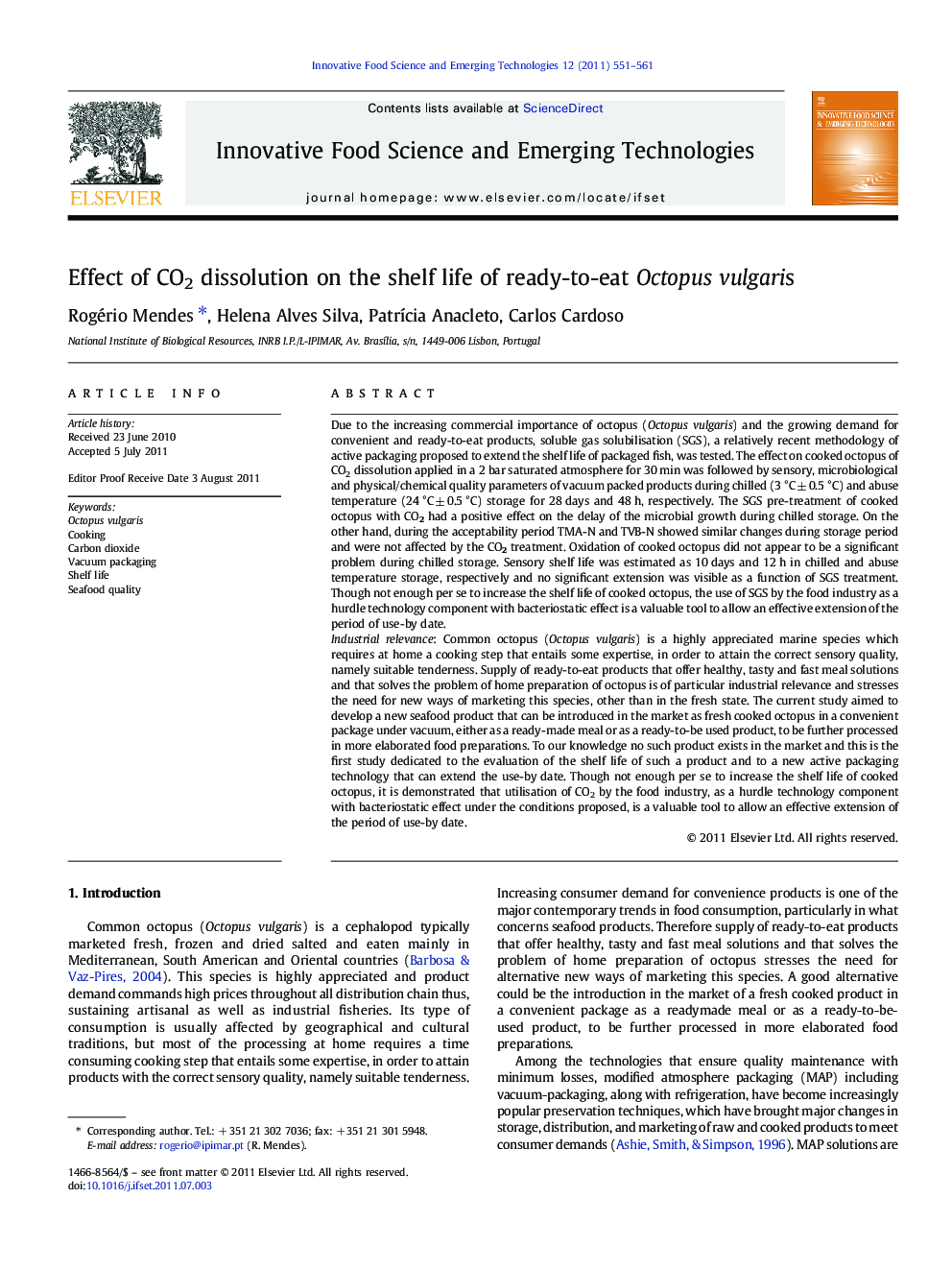| کد مقاله | کد نشریه | سال انتشار | مقاله انگلیسی | نسخه تمام متن |
|---|---|---|---|---|
| 2087031 | 1080626 | 2011 | 11 صفحه PDF | دانلود رایگان |

Due to the increasing commercial importance of octopus (Octopus vulgaris) and the growing demand for convenient and ready-to-eat products, soluble gas solubilisation (SGS), a relatively recent methodology of active packaging proposed to extend the shelf life of packaged fish, was tested. The effect on cooked octopus of CO2 dissolution applied in a 2 bar saturated atmosphere for 30 min was followed by sensory, microbiological and physical/chemical quality parameters of vacuum packed products during chilled (3 °C ± 0.5 °C) and abuse temperature (24 °C ± 0.5 °C) storage for 28 days and 48 h, respectively. The SGS pre-treatment of cooked octopus with CO2 had a positive effect on the delay of the microbial growth during chilled storage. On the other hand, during the acceptability period TMA-N and TVB-N showed similar changes during storage period and were not affected by the CO2 treatment. Oxidation of cooked octopus did not appear to be a significant problem during chilled storage. Sensory shelf life was estimated as 10 days and 12 h in chilled and abuse temperature storage, respectively and no significant extension was visible as a function of SGS treatment. Though not enough per se to increase the shelf life of cooked octopus, the use of SGS by the food industry as a hurdle technology component with bacteriostatic effect is a valuable tool to allow an effective extension of the period of use-by date.Industrial relevanceCommon octopus (Octopus vulgaris) is a highly appreciated marine species which requires at home a cooking step that entails some expertise, in order to attain the correct sensory quality, namely suitable tenderness. Supply of ready-to-eat products that offer healthy, tasty and fast meal solutions and that solves the problem of home preparation of octopus is of particular industrial relevance and stresses the need for new ways of marketing this species, other than in the fresh state. The current study aimed to develop a new seafood product that can be introduced in the market as fresh cooked octopus in a convenient package under vacuum, either as a ready-made meal or as a ready-to-be used product, to be further processed in more elaborated food preparations. To our knowledge no such product exists in the market and this is the first study dedicated to the evaluation of the shelf life of such a product and to a new active packaging technology that can extend the use-by date. Though not enough per se to increase the shelf life of cooked octopus, it is demonstrated that utilisation of CO2 by the food industry, as a hurdle technology component with bacteriostatic effect under the conditions proposed, is a valuable tool to allow an effective extension of the period of use-by date.
► Cooked octopus was processed with a CO2 saturated atmosphere and storage quality was followed in vacuum packed products.
► CO2 processing has a clear bacteriostatic effect and contributed to the improvement of microbiological quality of products.
► Shelf life of cooked octopus was 10 days (3 °C) and 12 h (24 °C) and was not extended by CO2 and vacuum packaging.
► Chemical quality parameters are not suitable as quality indicators in the packaging conditions studied.
► Application of additional barriers with CO2 and vacuum packaging will allow an effective extension of the use-by date.
Journal: Innovative Food Science & Emerging Technologies - Volume 12, Issue 4, October 2011, Pages 551–561